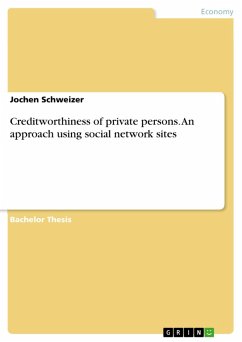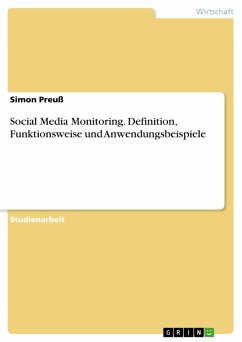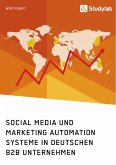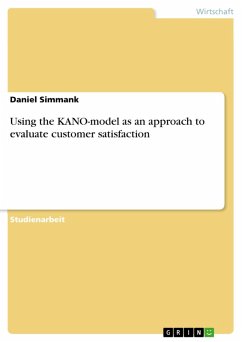Bachelor Thesis from the year 2014 in the subject Business economics - Offline Marketing and Online Marketing, grade: 2,0, Rhine-Waal University of Applied Sciences, language: English, abstract: On 31 December 2013, 757 million users logged on to Facebook. The tremendous number shows the huge size of the Facebook network. 1,23 Billion active monthly users produce more than 30 billion pieces of information every month. The stunning size of information can be used for different analyses. One area of application may be the checking of the creditworthiness of private persons. In today's world, the checking of the creditworthiness of private persons becomes more important, due to the increasing distance trade. The different trade partners usually don't know each other. That leads to an information asymmetry in the sense of reliability. Additionally, the number of private insolvent person increased since 2000 dramatically. In 2000 there were around 14024 private insolvent persons in Germany and in 2013 already 121.784 (see figure 1). Even if the private insolvencies decreased after 2010, it is still on a high level. To resolve this information asymmetry and reduce the risk of the inability of customers to pay, companies can use the provided services of credit reporting agencies like Schufa, Creditreform or Arvato Infoscore. Those credit reporting agencies use different public and non-public sources to evaluate a private person's creditworthiness. The highly discussed social network data could be a future database for the evaluation of the creditworthiness of private persons. Not only the high numbers of users , but also the available data on social networks, makes it an interesting source of information about a private person's financial situation.
Dieser Download kann aus rechtlichen Gründen nur mit Rechnungsadresse in A, B, BG, CY, CZ, D, DK, EW, E, FIN, F, GR, HR, H, IRL, I, LT, L, LR, M, NL, PL, P, R, S, SLO, SK ausgeliefert werden.









